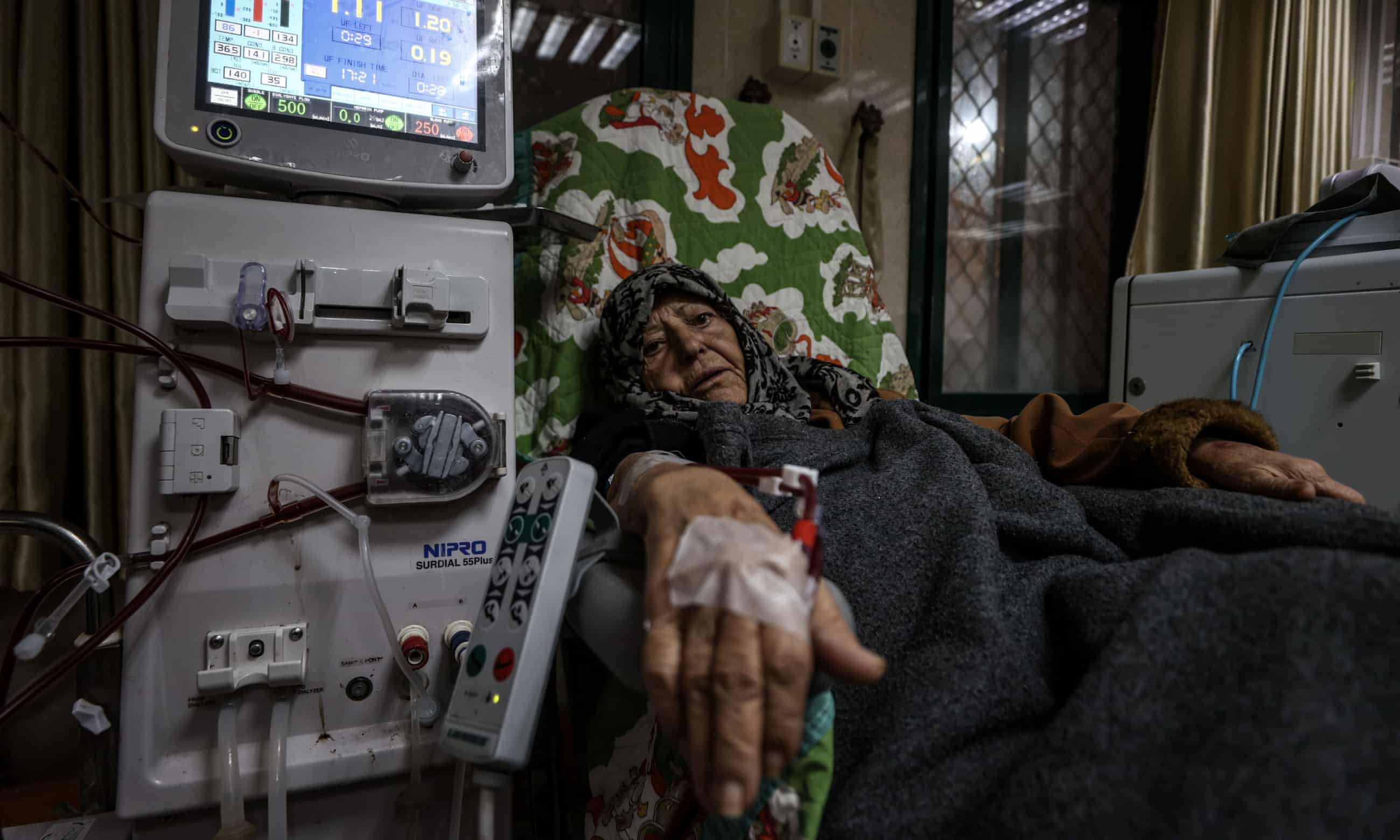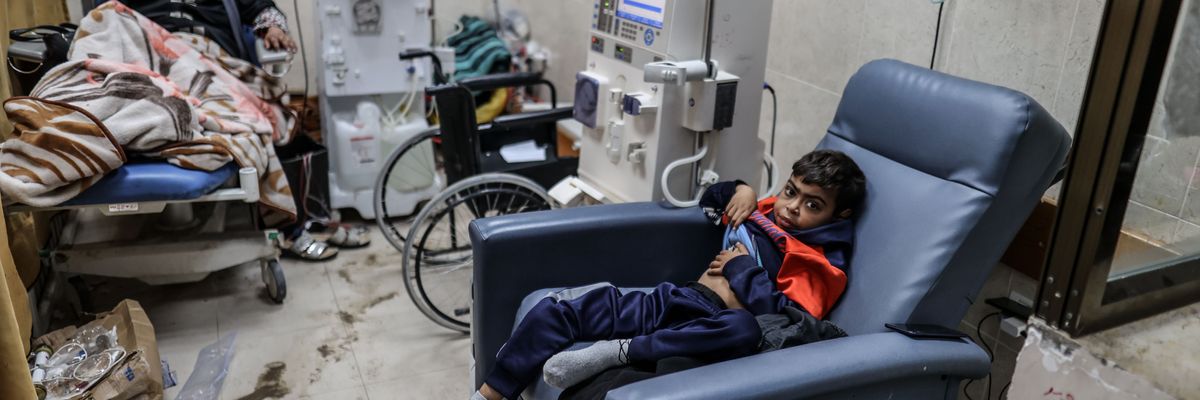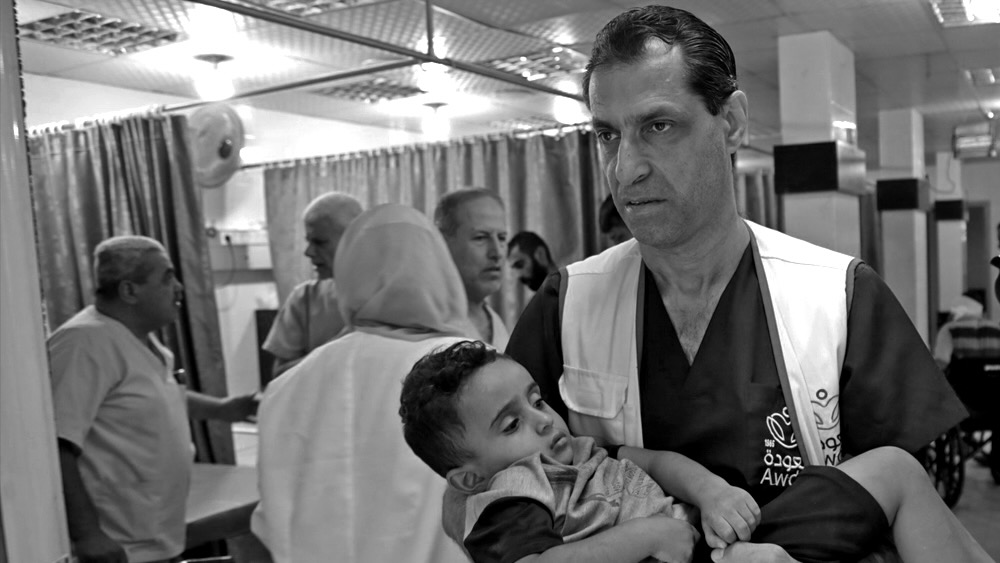Israeli Assault Leaves Gaza’s Nasser Hospital ‘Not Functional’
Original article by JESSICA CORBETT republished from Common Dreams under Creative Commons (CC BY-NC-ND 3.0).

The WHO “was not permitted to enter” the facility in recent days, said the agency chief, warning that “the cost of delays will be paid by patients’ lives.”
World Health Organization Director-General Tedros Adhanom Ghebreyesus announced Sunday that the largest hospital in the southern Gaza Strip “is not functional anymore, after a weeklong siege followed by the ongoing raid” by Israeli forces.
After claiming that Hamas was using Nasser Hospital in Khan Younis for “military activity” and some hostages’ bodies may be there, the Israel Defense Forces on Thursday began raiding the facility, where around 10,000 people had sought shelter. Sources there said the IDF bombed “a ward full of patients” and multiple people who were dependent on oxygen have died due to power outages.
Tedros highlighted on Sunday that the WHO team “was not permitted to enter” the facility in recent days “to assess the conditions of the patients and critical medical needs, despite reaching the hospital compound to deliver fuel alongside partners.”
“There are still about 200 patients in the hospital. At least 20 need to be urgently referred to other hospitals to receive healthcare; medical referral is every patient’s right,” he added. “The cost of delays will be paid by patients’ lives. Access to the patients and hospital should be facilitated.”
Later Sunday, the Palestinian Ministry of Health in Gaza said that “150 patients who cannot move are piled inside the rooms and corridors of the old building at Nasser Medical Complex without medical care after the arrest of 70 of the complex’s management and medical staff.”
“The occupation refuses to evacuate patients for treatment in other hospitals, which endangers their lives, including seven intensive care patients, five dialysis patients, [and] three newborns in the nursery, in addition to cases of burns, amputations, quadriplegia, childbirth, and others,” the ministry added.
The IDF said on Telegram that in its operations around the facility, Israeli troops apprehended “hundreds of terrorists and other terror suspects who were hiding in the hospital, some of whom had posed as medical staff,” including alleged participants in the October 7 Hamas-led attack that led to the war.
Noting IDF claims that soldiers aimed to recover the remains of hostages believed to be in the facility, The Washington Postreported that “Israeli forces have not yet found the bodies of any hostages but said on Sunday that they discovered medicine at the hospital bearing the names of Israelis who were abducted by Hamas.”
The Israeli assault on the Hamas-governed enclave has killed nearly 29,000 Palestinians, injured over 68,800 others, devastated civilian infrastructure—including hospitals—and left most of Gaza’s 2.3 million residents displaced, hungry, and at risk of disease. Global experts and critics have accused Israel of genocide, including in a South Africa-led case before the International Court of Justice (ICJ).
In response to IDF orders to leave northern Gaza, most residents are now crammed into the southern part of the strip. According toAl-Jazeera:
Al-Amal Hospital, the only other major medical facility still operational in Khan Younis, continues to be a target of Israeli attacks. The Palestine Red Crescent Society (PRCS) on Sunday said Israeli forces targeted the third floor of the hospital with artillery fire.
The Israeli military has expanded its siege on Khan Younis and its medical facilities as it pushed further south into Rafah on the border with Egypt.
Throughout the week, people around the world including humanitarian and United Nations leaders have pressured Israel to refrain from a full-scale attack on Rafah. The ICJ on Friday echoed U.N. Secretary-General António Guterres’ warning that it “would exponentially increase what is already a humanitarian nightmare with untold regional consequences.”
Original article by JESSICA CORBETT republished from Common Dreams under Creative Commons (CC BY-NC-ND 3.0).
- ‘As A Human Being, I Beg’: Doctors Say Cease-Fire In Gaza Only Way To Save Countless Lives ›
- Head Of Bombed Gaza Hospital Appeals Directly To Biden ›
- Israeli Forces ‘Responsible,’ Gaza Officials Say As Oxygen Cutoffs Kill Five Patients ›
- IDF Storms Largest Hospital In Southern Gaza And Attacks ‘Ward Full Of Patients’ ›



